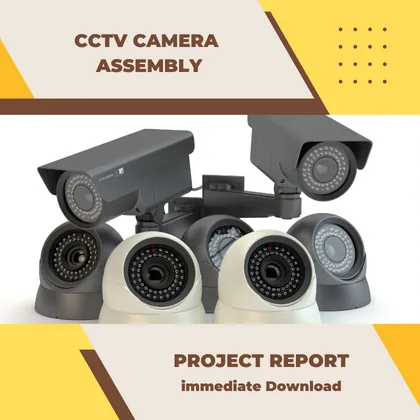Description
CCTV Camera Assembly Unit Project Report is available on this page for download. You need to follow the steps and get it online. If you are planning to start your entrepreneurial journey by initiating a small-scale business, then you have made the right choice by choosing a CCTV Camera Assembly unit set up from many profitable business ideas in India. You can easily start your CCTV Camera business with low capital investment. You need to know a lot about this business as it is just the beginning, and you might have many doubts and queries about this startup.
One can explore all the important details about this start-up that we have written in our project report. Our experts have made your work easy by writing a CCTV Camera Assembly Unit project report that you will require to avail bank loan for this business and also using it as a map for your new journey.
CCTV (Closed Circuit Television) cameras are a common form of surveillance used for security and monitoring purposes. They transmit video signals to a specific location and are widely used in both residential and commercial settings. The cameras come in various shapes, sizes, and resolutions and can be either analog or digital.
Analog cameras typically use coaxial cables to transmit video signals to a monitor or recording device, while digital cameras use digital IP protocols to transmit and store data on a network. Digital cameras offer higher-quality images and the ability to access footage from remote locations. You can start a business by manufacturing LED bulbs and fans along with CCTV cameras. Full details of LED bulb and fan manufacturing are available on this website
CCTV Camera Assembly Unit Project Report PDF For Bank Loan India
Table of Contents
- 1 CCTV Camera Assembly Unit Project Report PDF For Bank Loan India
- 2 Need for CCTV cameras
- 3 How to Download CCTV Camera Manufacturing Project Report
- 4 Types of CCTV Cameras
- 5 Why Do I Start CCTV Camera Assembly Unit In India?
- 6 Scope of CCTV Camera Business in the Indian Market
- 7 How Much Money Do I Need to Start A CCTV Camera Business in India
- 8 Machinery and Equipment Needed to Start CCTV Camera Assembly Business
- 9 License and Permits Needed to Start CCTV Cameras Business
- 10 How Do I Assemble CCTV Camera?
- 11 Pricing Strategy of CCTV Cameras
- 12 How Do I Promote CCTV Cameras Assembly Unit?
CCTV cameras can be used for a range of purposes, including deterring crime, monitoring employee behavior, and ensuring public safety. The footage captured by CCTV cameras can also be used as evidence in criminal investigations. However, the use of CCTV cameras raises privacy concerns, and it is important to balance the need for security with the protection of individuals’ privacy rights.
CCTV cameras are a useful tool for security and monitoring, but their use should be carefully considered and regulated to ensure they do not infringe on individual privacy rights.
CCTV Camera project report PDF is a necessary document that will help you get all the necessary licenses, help you set up this business, and avail financial assistance from the banks. You can use it as a map that has all the solutions to your doubts and can resolve your problems in a gist of time.
Need for CCTV cameras
CCTV cameras, or Closed Circuit Television cameras, are becoming increasingly popular for their ability to provide enhanced security and surveillance. In today’s world, where crime and security concerns are constantly on the rise, the need for effective surveillance systems is more pressing than ever. There are various needs for CCTV cameras and their importance in different settings.
Deterring Crime
- One of the primary reasons for installing CCTV cameras is to deter crime. The mere presence of a CCTV camera can serve as a powerful deterrent, preventing potential criminals from committing crimes in the vicinity. In case a crime does occur, the footage captured by the CCTV cameras can be used to identify the culprit and aid in investigations.
Monitoring Employee Behavior
- In commercial settings, CCTV cameras can be used to monitor employee behavior. This can help reduce theft, improve productivity, and ensure compliance with company policies. The footage captured by the cameras can also be used as evidence in case of any disputes.
Ensuring Public Safety
- CCTV cameras can play a crucial role in ensuring public safety in public spaces such as parks, public transport, and shopping centers. The footage captured by the cameras can help monitor potential safety hazards and respond quickly in case of an emergency.
Facilitating Investigations
- The footage captured by CCTV cameras can be used as evidence in criminal investigations. It can provide valuable information and help in identifying suspects, reconstructing events, and establishing the timeline of a crime.
Privacy Concerns
- While the use of CCTV cameras provides numerous benefits, it also raises privacy concerns. It is important to balance the need for security with the protection of an individual’s privacy rights. The installation and use of CCTV cameras should be regulated to ensure that they do not infringe on individuals’ privacy.
CCTV cameras play a vital role in providing enhanced security and surveillance in various settings. From deterring crime to facilitating investigations, the benefits of CCTV cameras are numerous. However, their use should be regulated to ensure that they do not infringe on individuals’ privacy rights.
How to Download CCTV Camera Manufacturing Project Report
Gone are the days of waiting at the door of the expert, as a result, you can now get your CCTV Camera assembly unit project report in hand, by instantly downloading the report in pdf format.
First Step – Click add to basket >> Check Out >> Payment
Second Step – Immediately after successful payment, you will get a link to download the report. You can download the report immediately from this link.
Types of CCTV Cameras
Analog CCTV Cameras
- Analog CCTV cameras are the traditional form of CCTV cameras that have been in use for several decades. These cameras typically use coaxial cables to transmit video signals to a monitor or recording device. They are best suited for smaller surveillance systems and for those who do not require high-resolution images.
Digital CCTV Cameras
- Digital CCTV cameras, also known as IP cameras, use digital IP protocols to transmit and store data on a network. These cameras offer higher-quality images and the ability to access the footage from remote locations. Digital CCTV cameras can also be integrated into a larger network of security devices and provide more advanced features such as motion detection and night vision.
Bullet Cameras
- Bullet cameras are cylindrical and are typically mounted on a wall or a ceiling. They are best suited for outdoor use and can provide a wide field of view. They are available in both analog and digital versions.
Dome Cameras
- Dome cameras are dome-shaped and are typically mounted on a ceiling. They are best suited for indoor use and provide a discreet surveillance solution. They are available in both analog and digital versions and can also be used with infrared technology for night vision capabilities.
PTZ Cameras
- PTZ (Pan-Tilt-Zoom) cameras are cameras that can be controlled remotely to move in different directions. These cameras provide greater flexibility in terms of coverage and can be used to monitor large areas. PTZ cameras are best suited for outdoor use and are available in both analog and digital versions.
Hidden Cameras
- Hidden cameras, also known as spy cameras, are cameras that are disguised as everyday objects such as clocks, smoke detectors, or even plants. They are best suited for covert surveillance and can be used to monitor a specific area without being noticed.
In conclusion, CCTV cameras come in various types and sizes, each with its unique features and benefits. Whether you are looking for a small surveillance solution or a larger network of security devices, there is a CCTV camera that is right for your needs. It is important to carefully consider your requirements and the type of surveillance you require before choosing a CCTV camera.
Why Do I Start CCTV Camera Assembly Unit In India?
There are several reasons why you should start a CCTV camera assembly business can be beneficial:
- High Demand: The demand for CCTV cameras is growing, as people become more aware of the importance of security. As a result, the market for CCTV cameras is expanding, making it a lucrative business opportunity.
- Easy to Start: The entry barriers to starting a CCTV camera business are relatively low, as the equipment and technology are readily available and accessible. This makes it a relatively easy business to start, especially for individuals with technical expertise in electronics and computer networking.
- High Margins: CCTV cameras and related equipment can generate high margins, making it a profitable business opportunity. The margins can be even higher if you choose to focus on higher-end cameras and systems with advanced features.
- Recurring Revenue: Once a CCTV system is installed, the customer may require ongoing maintenance and support. This can generate recurring revenue for your business, as you may be able to charge for routine maintenance and upgrades to the system.
- Versatile Applications: CCTV cameras can be used in a variety of applications, such as home security, commercial security, and surveillance in public spaces. This versatility makes the business opportunity appealing to a wide range of customers, allowing you to target different markets and segments.
- Improved Security: By installing CCTV cameras, businesses and individuals can improve their security and reduce the risk of theft, vandalism, and other criminal activities. This can provide peace of mind and a sense of security to your customers, making them more likely to recommend your services to others.
- Growth Potential: As the demand for CCTV cameras continues to grow, there is significant potential for growth in the business. You can expand your offerings to include other security systems, such as access control systems, or expand your business to other geographic locations.
Overall, starting a CCTV camera business can be a profitable and fulfilling opportunity, as long as you have the technical expertise and business acumen to succeed. By offering high-quality products and services, you can build a reputation for excellence and establish a loyal customer base that will support your business for years to come.
Also Read Article on Electric Extension Board Making Business
Scope of CCTV Camera Business in the Indian Market
The Closed Circuit Television (CCTV) camera market in India has been growing rapidly in recent years due to the increasing need for security and surveillance. With the growing economy, urbanization, and rising disposable incomes, the demand for CCTV cameras in India is expected to increase significantly in the coming years.
Growing Demand for Security and Surveillance
- The increasing need for security and surveillance is one of the primary drivers of the CCTV camera market in India. With rising crime rates, the demand for CCTV cameras for both commercial and residential purposes has been increasing. The government’s focus on improving public safety has also resulted in the installation of CCTV cameras in public spaces such as parks, shopping centers, and public transport.
Urbanization and Increasing Disposable Incomes
- Urbanization and the growth of the middle class in India have led to an increase in disposable incomes. This has resulted in an increased demand for security and surveillance systems, including CCTV cameras, in residential homes. As more people move into cities and suburban areas, the demand for CCTV cameras is expected to continue to grow.
Technological Advances
- Technological advances in the field of surveillance and security have also contributed to the growth of the CCTV camera market in India. The introduction of digital CCTV cameras, also known as IP cameras, has made it possible to access footage from remote locations and provide higher-quality images. The integration of artificial intelligence and machine learning into CCTV cameras has also led to the development of more advanced features such as motion detection and facial recognition.
Government Initiatives
- The government of India has been supportive of the development of the CCTV camera market by providing various incentives and subsidies. The government has also made it mandatory for certain businesses, such as banks and ATMs, to install CCTV cameras for security purposes. This has resulted in a significant increase in the demand for CCTV cameras in the commercial sector.
Competitive Market
- The CCTV camera market in India is highly competitive, with a large number of domestic and international players vying for a share of the market. While this competition has led to the availability of a wide range of products at competitive prices, it has also made it challenging for smaller players to survive in the market.
The CCTV camera market in India is expected to grow significantly in the coming years due to the increasing demand for security and surveillance, urbanization, and rising disposable incomes. The government’s support and technological advances have also contributed to the growth of the market. However, the highly competitive market presents challenges for smaller players. Nevertheless, the market presents a promising opportunity for those who can navigate the challenges and offer innovative and high-quality products.
How Much Money Do I Need to Start A CCTV Camera Business in India
The cost of starting a CCTV camera business in India can vary greatly, but with proper planning and budgeting, it is possible to estimate the expenses involved. Here is a more detailed explanation of the costs involved in starting a CCTV camera business in India:
- Equipment: The most important aspect of starting a CCTV camera business is the equipment. The cost of cameras and other equipment, such as DVRs, wiring, and storage devices, can range from 50,000 to 2,00,000 rupees or more. The cost will depend on the quality and features of the cameras and equipment you choose to install. It’s important to invest in high-quality equipment that can deliver clear and reliable images, as this will directly impact the success of your business.
- Installation: The cost of installation can range from 5,000 to 20,000 rupees per camera, depending on the complexity of the installation and the cost of labor. This cost will depend on the number of cameras you install, the location of the cameras, and the wiring required. The installation cost can also be influenced by the local labor costs and the availability of experienced technicians.
- Marketing and advertising: Marketing and advertising expenses can range from 20,000 to 50,000 rupees, depending on the marketing strategies you plan to employ. This cost will include the expenses incurred in advertising your business, such as printing brochures and flyers, creating a website, and other promotional activities. A well-planned marketing strategy will help you reach your target market and increase your sales.
- Legal and miscellaneous expenses: Legal expenses, such as registering your business and obtaining necessary licenses, can cost up to 20,000 rupees. Miscellaneous expenses, such as office rent and utilities, can range from 10,000 to 50,000 rupees. These expenses are not directly related to the installation of CCTV cameras, but they are still important to consider when starting a business.
In addition to these expenses, it’s important to consider the ongoing costs of running a CCTV camera business, such as maintenance and repair costs, electricity bills, and other miscellaneous expenses.
Machinery and Equipment Needed to Start CCTV Camera Assembly Business
Starting a CCTV camera business requires obtaining certain machinery and equipment to manufacture and install cameras. The exact equipment needed will depend on the type and scale of your business, but the following are some of the common machinery and equipment required for a CCTV camera business:
- Installation Equipment: If you plan to install CCTV cameras, you will need equipment such as ladders, drill presses, conduits, and wiring. You may also need tools for testing and commissioning the cameras.
- Computer Equipment: You will need computer equipment such as laptops, desktop computers, and servers to manage and store video footage captured by the cameras.
- Office Equipment: You will need office equipment such as phones, printers, and fax machines to manage your business operations.
- Storage Equipment: You may need storage equipment such as hard drives or cloud storage to store video footage captured by the cameras.
- Vehicle: If you plan to travel to customer sites to install cameras, you may need a vehicle.
- Test Equipment: You will need test equipment such as multimeters and oscilloscopes to test cameras and other electrical components.
License and Permits Needed to Start CCTV Cameras Business
Starting a CCTV camera business typically requires obtaining certain licenses and permits from local, state, and federal authorities. The exact requirements vary depending on the location and type of business, but the following are some of the common licenses and permits required for a CCTV camera business:
- Business License: This is a license issued by the local government to operate a business in a specific location. Requirements for obtaining a business license vary by state and municipality, so it’s important to check with your local authorities for specific requirements.
- GST Registration: If you plan to sell CCTV cameras, you may need to obtain a GST Certificate from the state where your business is located. This permit allows you to collect GST on your products and services.
- Electrical Contractor License: If you plan to install or repair CCTV cameras, you may need to obtain an electrical contractor license. This license certifies that you have the knowledge and skills to work with electrical systems and install or repair cameras safely. Requirements for obtaining an electrical contractor license vary by state, so it’s important to check with your local authorities for specific requirements.
- Security License: In some states, you may need to obtain a security license to operate a CCTV camera business. This license certifies that you meet the requirements for operating a security business and provides customers with peace of mind that your business is legitimate and reputable.
- Building Permit: If you plan to install cameras on a commercial property, you may need to obtain a building permit from the local government. This permit certifies that the installation meets local building codes and safety standards.
- Privacy Permit: In some cases, you may need to obtain a privacy permit to install cameras in public areas or on private property. This permit certifies that you are aware of and abide by privacy laws and regulations.
By obtaining the necessary licenses and permits, you can ensure that your business is compliant with local, state, and federal regulations and provide your customers with peace of mind that your business is legitimate and reputable.
How Do I Assemble CCTV Camera?
The assembling of CCTV cameras typically involves the following steps:
- Design and Development: The first step in the manufacturing process of CCTV cameras is the design and development phase. During this phase, engineers design the camera and develop the software and firmware that will run on the camera. The design will typically include specifications such as camera resolution, lens specifications, and connectivity options.
- Sourcing of Components: The next step is sourcing the components required to build the cameras. This includes the lens, image sensor, circuit boards, and other components. The components are sourced from suppliers and manufacturers.
- Assembly: Once the components are sourced, the cameras are assembled. During the assembly process, the components are assembled into a single unit and tested to ensure that they are functioning correctly.
- Testing: After the cameras are assembled, they are thoroughly tested to ensure that they meet the required specifications. This includes testing the cameras for image quality, lens distortion, and connectivity.
- Packaging: Once the cameras have passed testing, they are packaged for shipment. The cameras are packaged along with any necessary cables, power adapters, and mounting hardware.
- Shipping: The final step in the manufacturing process of CCTV cameras is shipping. The cameras are shipped to distributors or directly to customers, depending on the business model.
Pricing Strategy of CCTV Cameras
Pricing strategy is a critical aspect of any business, and the same applies to a CCTV camera business. The following are some of the key subheadings that can be considered when developing a pricing strategy for CCTV cameras:
- Cost-plus pricing: This involves determining the cost of goods sold (COGS) and adding a markup to arrive at the final price. This type of pricing strategy is commonly used in the security industry as it allows you to cover your costs and make a profit while still offering competitive prices.
- Value-based pricing: This involves setting prices based on the perceived value that the customer derives from the product. In the case of CCTV cameras, value-based pricing could involve pricing cameras based on features such as resolution, image quality, and connectivity options.
- Competitor-based pricing: This involves analyzing the prices of your competitors and setting your prices accordingly. This can be a useful strategy for staying competitive in a crowded market, but it may also limit your ability to differentiate your products and charge premium prices for high-end cameras.
- Volume-based pricing: This involves offering discounts to customers who purchase large quantities of cameras. This type of pricing strategy can be useful for encouraging bulk purchases and building relationships with large customers.
- Geographical pricing: This involves considering regional differences in the cost of goods and services and adjusting your prices accordingly. For example, you may need to charge higher prices in regions where the cost of living is higher to cover your costs.
How Do I Promote CCTV Cameras Assembly Unit?
Marketing is a critical aspect of any business, and the same applies to a CCTV camera business. A successful marketing strategy can help you reach your target market, generate leads, and increase sales. Here are some key elements of a marketing strategy for a CCTV camera business:
- Target Market: Define your target market by considering factors such as geographic location, demographic characteristics, and buying behavior. This will help you tailor your marketing messages to the specific needs and preferences of your target market.
- Branding: Develop a strong brand identity that sets you apart from your competitors. This could include elements such as a logo, tagline, and company color palette.
- Online Presence: Establish a strong online presence through a website and social media profiles. This will help you reach a wider audience and engage with customers in real time.
- Content Marketing: Develop a content marketing strategy that provides value to your target market and positions your business as a thought leader in the security industry. This could include blog posts, infographics, and white papers that educate customers about the benefits of CCTV cameras and security systems.
- Influencer Marketing: Partner with influencers in your target market to reach a wider audience and build credibility for your brand. This could involve paying influencers to promote your products or working with them to develop content that positions your business as an expert in the security industry.
- Trade Shows: Attend trade shows and events in your industry to network with potential customers and build your brand. This can be a valuable opportunity to showcase your products and services and generate leads.
- Referral Marketing: Encourage customers to refer their friends and family to your business by offering incentives such as discounts or rewards. This can help you build a loyal customer base and expand your reach through word-of-mouth marketing.
Contents of CCTV Camera Project Report
| Sr. No. | Particulars |
| 1 | Genesis |
| 2 | Introduction |
| 3 | Working of CCTV Camera |
| 4 | Advantages of CCTV Camera |
| 5 | Types of CCTV Camera |
| 6 | CCTV Surveillance Market Analysis |
| 7 | Description of Equipment’S |
| 8 | Assembly Process |
| 9 | Components Used For CCTV Camera |
| 10 | CCTV Camera Unit License & Registration |
| 11 | Implementation Schedule |
| 12 | Financial Assistance Required |
| 13 | Computation of Production |
| 14 | Projected Profitability Statement |
| 15 | Projected Balance Sheet |
| 16 | Cash Flow Statement |
| 17 | Computation of Working Capital Requirement |
| 18 | Depreciation |
For whom is CCTV Camera Making Unit Project report format useful?
- CA Chartered Accountants
- Tax Consultants
- Small Business Owners
- Students
- Engineers
- Who wants to self-study
In addition to those who want to prepare project reports themselves. It will help you in assisting to write down the project report and applying for a bank loan. You can also get customized project report for any business from our website.
Sample Project Report Format of CCTV Camera Assembly Unit
In our project report format, we have covered the required technology details, its diagrams, flow charts etc. as and when required or deemed fit to include. Also, we can help you to prepare in-depth financial calculations which are necessary for the Investor/bank.
You will get the report data from our Project Report in PDF. You can also modify the information according to your need. You will be able to access the data easily according to your requirement.
Conclusion
Starting a CCTV camera business in India can be a profitable venture, but it requires careful planning and budgeting. The costs involved in starting a CCTV camera business can vary greatly, and it’s important to estimate the expenses as accurately as possible to ensure the success of your business. It’s also important to consider the ongoing costs and to plan for these in your budget. With the right equipment, marketing strategies, and a solid business plan, you can start a successful CCTV camera business in India.
CCTV Camera Assembly Unit is a profitable venture that needs a well written business project report including every crucial fact about this business-like market feasibility, future of business, legalities, quality, production etc. This business can rise in a short time period, and it is a continuous business that can expand sales throughout the years. You just need to follow all the guidelines mentioned in our project report.
Frequently Asked Questions On CCTV Camera Assembly Unit Project Report PDF For Bank Loan India
What is the demand for CCTV cameras?
There is a growing demand for CCTV cameras due to increased concerns about security and surveillance. With the advancement of technology, there are more options available to meet the diverse needs of customers, so the demand for CCTV cameras is expected to remain strong in the future.
What are the start-up costs for a CCTV camera business?
The start-up costs for a CCTV camera business vary depending on the type and scale of the business. Factors such as equipment and machinery, office space, licensing and permitting, and marketing and advertising can all impact the total cost. Start-up costs can range from a few thousand dollars for a small, home-based business to several hundred thousand dollars for a larger, commercial operation.
What are the ongoing expenses for a CCTV camera business?
Ongoing expenses for a CCTV camera business include costs such as employee salaries, office rent, insurance, utilities, marketing and advertising, and supplies and equipment. It's important to carefully budget for these ongoing expenses to ensure the long-term financial stability of your business.
What skills are required to start a CCTV camera business?
To start a CCTV camera business, you will need knowledge and skills in areas such as manufacturing, installation, and customer service. You may also need knowledge of local and state regulations and laws related to security and privacy. Technical skills in electronics, computer networking, and software programming may also be required, depending on the type and scale of your business.
How can I market my CCTV camera business?
There are many ways to market a CCTV camera business, including online and offline advertising, public relations, networking, and referral marketing. You can also participate in trade shows and industry events to showcase your products and services, and build relationships with customers and potential partners.
How to start CCTV Camera Assembly Unit in India?
You can easily start CCTV Camera Assembly Unit in India by exploring the market to know the best location in your area. You will also have to study the CCTV Camera Assembly Unit project report PDF in India to get every important detail about this business.
What are the requirements to start CCTV Camera Assembly business in India?
You require a well written CCTV Camera manufacturing project report PDF for this business. This you can get from our website in a gist of time. It contains every significant detail about this startup that can benefit you in making wise decisions. You will also have to arrange space and buy equipments that we have listed in the project report.
Where can i get project report on CCTV Camera PDF for bank loan?
Well, you can explore the best CCTV Camera project report PDF on our website and take help by checking out all the important details for your new business from it. It will serve you as a guide using which you can write your own project report on CCTV Camera and submit it to the bank to avail loan for your new venture.
What is the right CCTV Camera Manufacturing project report pdf format for bank loan?
We have clearly stated the right format for this start up in our project report. You can check out the CCTV Camera manufacturing project report PDF details by downloading it after making a nominal payment to us. We have covered every important aspect of this venture in our report.
Can I download CCTV Camera Assembly Unit project report pdf in the format of excel or word file?
You can easily download CCTV Camera Assembly unit project report from our website in PDF Format and use it for writing your project report. If you want to get it in word or excel file. It is very simple to later convert the pdf to word or excel using free file converting tools.
Can I download CCTV Camera making project report and use it for bank loan under pmegp mudra and other government scheme?
The main objective of this project report is to highlight all important aspects of this business for your new set up and to provide sample format for preparing project reports for other purposes. However, according to your need, we will prepare customized project report for your set up so that you can get loan from the bank under any scheme.





